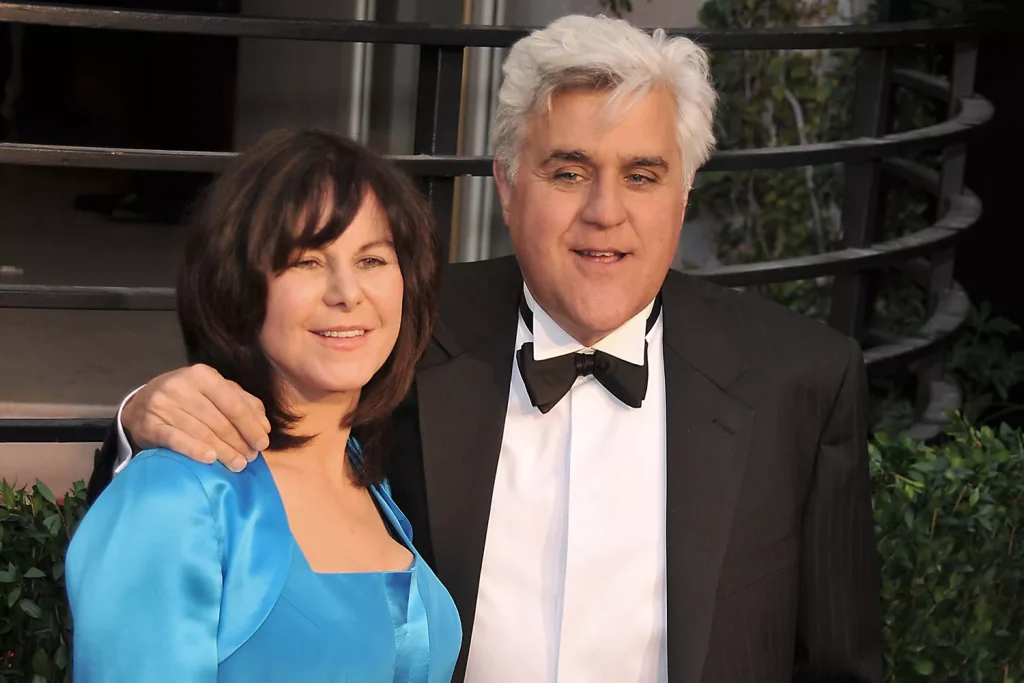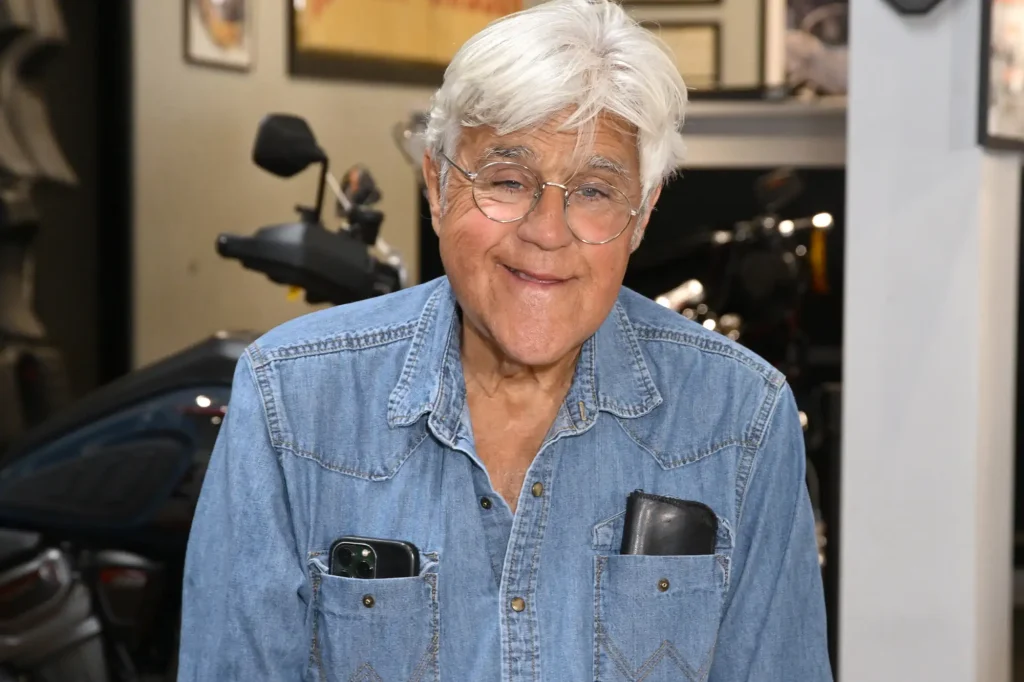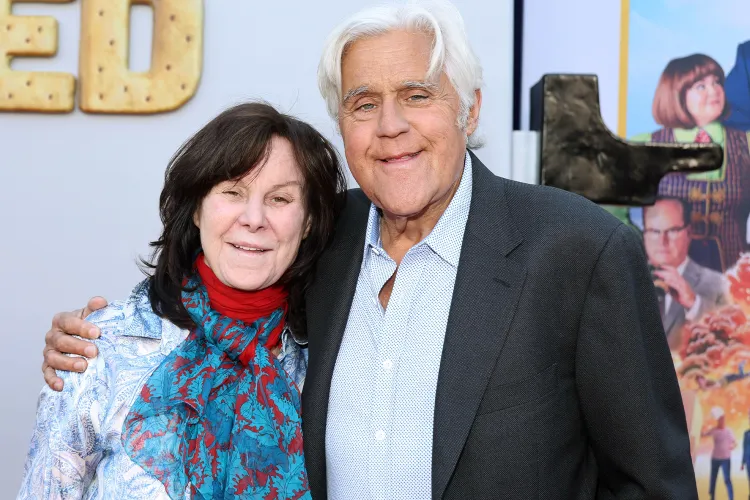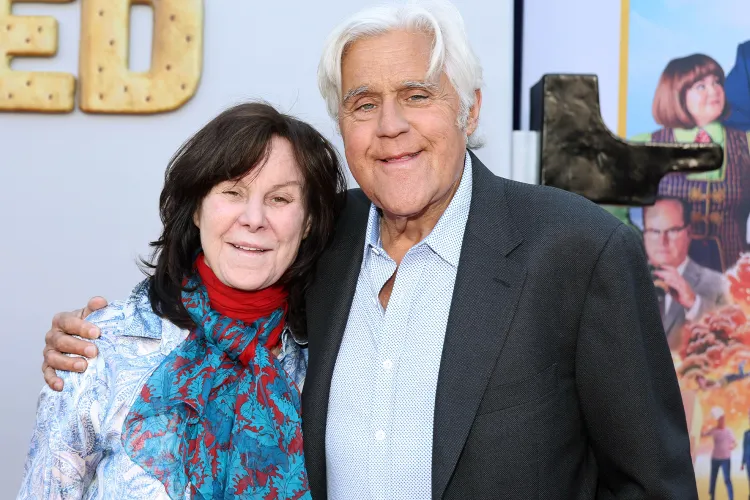Jay Leno Shares Heartfelt Role as Caregiver for Wife Mavis After Advanced Dementia Diagnosis — A 40-Year Marriage in a New Chapter
In a deeply personal and moving interview, comedian and TV icon Jay Leno has spoken openly about the journey he and his wife, Mavis Leno, are navigating following her diagnosis of advanced dementia and the mounting responsibilities that have come with it. The couple, married since 1980, have long been admired for their strong bond and shared values. Now, in the face of a serious medical challenge, Leno is framing his role not as sacrifice but as an extension of the promise he made decades ago — to stand by his partner, in every shape and phase of their life together.

In court documents filed in January 2024, Leno sought conservatorship over his wife’s estate, citing that Mavis had been diagnosed with “advanced dementia.” The filings noted that she sometimes does not know her husband, is unaware of her date of birth, and has experienced significant disorientation. On April 9, 2024, a judge in Los Angeles County Superior Court granted the conservatorship, finding that Leno was fit to serve and that Mavis was receiving “excellent care” with him.
Despite the gravity of the situation, Leno described the week-to-week reality of their life together with a clarity and affection that kept the tone grounded and hopeful. “When you get married, you sort of take a vow: ‘Will I live up to this? Or will I be like a sleazy guy if something happens to my wife, I’m out…’ No, I didn’t,” he said in an appearance on the In Depth with Graham Bensinger podcast. “I enjoy the time with my wife. I go home, I cook dinner for her, watch TV and it’s okay.” He added, of the caregiving, “It’s basically what we did before … except now I have to feed her and do all those things. But I like it. I like taking care of her.”
Leno’s comments reflect a deep sense of purpose rather than duty. He acknowledged that this chapter brings new challenges — moments of confusion, loss of independence, and changed routines — but he also emphasized the continuity of their relationship. “She’s a very independent woman, so I like that I’m needed,” he told Entertainment Tonight. In another interview, he explained how the daily realities of dementia are tempered by love, humor, and shared history. “I still make her laugh every day, and that’s always fun,” he said, describing the two of them re-watching old segments of The Tonight Show and her laughing anew at jokes she’d forgotten.
One of the more tender moments he shared involved flashcards bearing old photographs: “Honey, that’s President Obama. Remember we had dinner?” he would ask. She might say, “Oh, not me.” And he adds, “Yeah, honey, that was you!” He called it “kind of fun,” even as he acknowledged the deeper reality of supporting someone with dementia. For Leno, this is not merely a shift in circumstance but a reaffirmation of love and partnership. “At some point in my life I’m going to be called upon to defend myself. I think that’s really what defines a marriage. I mean, that’s really what love is,” he reflected.

Beyond their private moments, Leno is taking tangible steps to safeguard Mavis’s future. Upon granting the conservatorship, the court commented that their joint estate and assets would be managed to ensure that she is well-provided for in the event he predeceases her or if her condition further declines. The documentation described her condition as “incapable of executing the estate plan” and moving toward a “least restrictive environment” under his care.
The couple’s commitment is rooted in decades of shared history. Leno first met Mavis in the 1970s, and they wed in 1980 — long before his tenure on The Tonight Show made him a household name. Over the years, Mavis carved out her own path as a philanthropist, feminist and activist. Now, as she faces the progression of dementia, Leno’s role has shifted but his intention remains the same: to be present, protective and affectionate.
Friends and colleagues have taken note. Comedian and actress Margaret Cho shared in a TikTok post how she witnessed Leno’s gentle support of Mavis at a comedy club. She described how Jay leaned close and quietly explained what was happening to Mavis, who had some difficulty with the room’s dynamics. Cho called the moment “romance” and added, “That’s love.”
The broader context of caregiving for someone with dementia is complex and emotionally charged. Many families navigate feelings of loss, role reversal, uncertainty and — for the caregiver — the challenge of balancing dedication with personal well-being. When public figures speak candidly about these experiences, they bring awareness to what is all too often lived privately. Leno’s willingness to share aspects of this journey provides a window into the realities behind the headlines, offering resonance to the nearly 6 million Americans estimated to be living with dementia in 2025.

Yet Leno is careful to temper sentiment with realism. He acknowledged the difficulty with quiet, matter-of-factness. “There are going to be a couple of years that are tricky,” he said. “The first 46, really great. But it’s OK.” He said of his role that “It makes you feel wanted. You got a purpose now. So it’s good.” The absence of drama isn’t a sign of ease — it’s the articulation of a profound commitment. Leno is not glossing over the difficulty; he’s contextualizing it as a chapter of their long-standing story together.
Importantly, he emphasized that Mavis is “not in pain,” which helps him keep perspective. “It’s not like a tumor or cancer. It’s just a confusion that comes with Alzheimer’s and dementia. And that’s okay.” This framing does not minimize the condition, but rather anchors his commitment in steady caring rather than dramatic rescue.
For many of their fans, the Lenos represent what long-term love looks like beyond the highlight reels. Their life together has included red-carpet appearances, global philanthropy, a shared love of cars and comedy, and now, a deeply human test of endurance, adaptation and devotion. The public gaze often expects glamour, but here they offer something more: continuity, presence and the unglamorous reality of accepting change.
In coming years, the lens will likely shift further from celebrity to caregiving. For Jay, that doesn’t mean stepping back from his passions — he continues to collect cars, host events and maintain a public profile — but he ensures that no matter how far he travels, he “tries to be home every night.” That statement isn’t about fame; it’s about fidelity.
As the couple moves through this next phase, their story offers several resonant truths: that aging is universal, that illness doesn’t cancel identity, and that partnership can evolve rather than end when circumstances shift. While Leno acknowledges the challenge, he refuses to frame it as tragedy. Instead he calls it love in motion — caring in real time for the person he chose to spend his life with.
Their journey continues not in big statements but small gestures: guiding her hand to the sofa, prompting a memory about a dinner they shared, giving her the dignity of familiarity when the world looks strange. For many, that kind of intimate caregiving is invisible; for them, it’s in plain sight and spoken aloud. The headline may read “Jay Leno helps wife amid dementia,” but the sub-story is this: a marriage committed to staying together, even when nearly everything else shifts.
In the end, what stands out is the reaffirmation of a vow: in sickness and in health, as long as we both shall live. For Jay and Mavis Leno, those words are not just symbolic — they are being lived, every single day.


